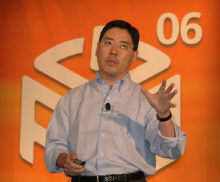Can Accenture learn to love SaaS?

Accenture and its competitors — both those based in US/Europe and the up-and-coming Indian IT services and outsourcing firms — are starting to take an interest in on-demand services. Even though they must be worried about the potential impact on their established business models, they can see on-demand revenues growing and more and more enterprises giving it a go. But what sort of engagements are they looking for? What will it take to bring them to love SaaS the way they currently love SAP, Siebel and the rest?

- Execute swiftly
- Downplay permanence (people tend to overplan a project if they see it as something for the long-term)
- Take advantage of the medium (don't just automate existing processes, get some extra leverage)
- Think of the immediate need
I think on-demand vendors more or less take the first and last points for granted. The point about downplaying permanence is an interesting one, and I'm sure every systems integrator has plenty of stories about projects that ran off the rails because customers got so nervous about the scale and scope of what they were implementing. Point three recalls re-engineering guru Michael Hammer's catchphrase, "Don't automate, obliterate" although in retrospect it was his choice of the word 'obliterate' that gave re-engineering such a bad vibe. If the technology of the time had allowed him to say instead 'empower your users to reinvent', perhaps his message would still be revered today.
But I digress. What Suh was outlining is a new approach for Accenture, and I imagine a large part of his role is to proselytize that message within his own organization, because it feels different from the way Accenture has traditionally worked and still works in many engagements today.
Will his message prevail? I would have thought the economics of SaaS mitigate against Accenture becoming a major SaaS enthusiast anytime soon — it makes far more money in a conventional software engagement, so it has no incentive to encourage customers to switch. But where customers insist or where the business case simply cannot be made with conventional on-premises solutions, then Accenture will fall in line with the SaaS option.
To get another perspective, I asked RightNow's CEO Greg Gianforte about how his company is working with systems integrators and he pointed to two areas where they see a lot of interest:
- Verticals. Most partners are working in verticals and to help support them RightNow has started introducing vertical templates in the latest release of its application stack, including the capability for partners to build and evolve their own templates.
- BPO. Business process outsourcers see a lot of potential to use on-demand platforms as a means of collaborating more closely with their customers in delivering outsourced services.
I can certainly imagine that Accenture and others will like the idea of developing their own intellectual property on top of on-demand platforms, and thus differentiating themselves in specific verticals. Combining that with outsourcing propositions must also be appealing. Effectively what it enables them to do is to offer their consulting services as-a-service (ie within an on-demand framework, taking advantage of the real-time collaboration that's possible in the online environment). In that context, it makes a whole lot of sense to adopt Bob Suh's four points and so I think perhaps I can see what he's driving at.